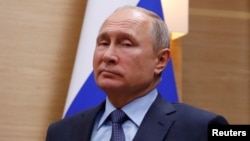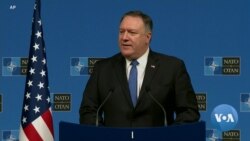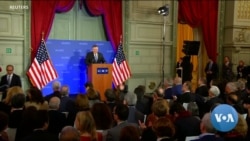Russian President Vladimir Putin said Wednesday his country would start developing intermediate-range nuclear missiles if the United States leaves a key arms agreement and begins developing the weapons as well.
Putin told Russian news agencies that a U.S. withdrawal from the treaty would mean Washington has concluded it "has to have these weapons" and that Moscow "will do the same."
U.S. Secretary of State Mike Pompeo told NATO ministers in Brussels Tuesday it will begin the six-month process of withdrawing from the Intermediate-Range Nuclear Forces Treaty in 60 days if Moscow does not regain compliance with the treaty.
WATCH: US Threatens To Withdraw from INF Missile Treaty With Russia
Pompeo accused Russia of deploying "multiple battalions of the SSC-8 missiles," a land-based, intermediate-range Cruise missile capable of carrying nuclear warheads. Moscow has denied deploying such weapon systems.
“It makes no sense for the United States to remain in a treaty that constrains our ability to respond to Russia’s violations. Russia has reversed the trajectory of diminishing nuclear risk in Europe,” Pompeo told reporters in Brussels.
The 1987 INF treaty, negotiated by then-U.S. President Ronald Reagan and Soviet leader Mikhail Gorbachev, eliminated all nuclear missiles with a range between 500 and 5,500 kilometers, reducing the ability to launch a nuclear strike at short notice.
NATO allies have voiced concern over the U.S. threat to withdraw, fearing a new arms race in Europe; however, NATO foreign ministers agreed Tuesday to formally declare Russia in "material breach" of the treaty.
Pompeo delivered a pointed message to European allies, says Jonathan Eyal, international director at the Royal United Services Institute in London.
“Instead of complaining all the time about the United States walking away from the treaty, the Europeans should spend a bit of time looking at why the United States is withdrawing from the treaty," he said.
“No European state has contradicted the American position. That intelligence information indicates a Russian gross violation of that treaty. So I think the American argument would be, ‘Let us get together and convey a strict message to Moscow that if it wants the treaty saved, it will have to make a concession and it will have to abide by the treaty,'” Eyal told VOA.
Meanwhile, in Brussels Tuesday, during a separate speech hosted by the German Marshall Fund of the United States, Pompeo dismissed claims that the United States was withdrawing from the international stage under President Donald Trump’s "America First" policy.
WATCH: Henry Ridgwell's video report
“In the finest traditions of our great democracy, we are rallying the noble nations to build a new liberal order that prevents war and achieves greater prosperity,” Pompeo said.
He added that President Donald Trump was reshaping the global system based on nation states, not multilateral institutions.
“We are acting to preserve, protect, and advance an open, just, transparent and free world of sovereign states,” Secretary Pompeo told the audience of diplomats and government officials.
He took aim at the European Union and said Britain’s decision to quit the bloc was evidence that supranational organizations were not working.
A spokesperson for the European Commission said Pompeo was "one of those people who come to Brussels and coin an opinion without knowing how our system works."









